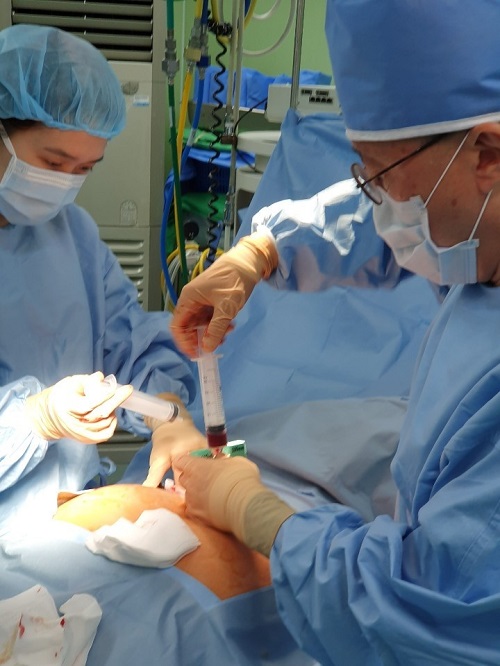The fundamental treatment for intractable blood diseases
'Irreplaceable' technology… Applicable to numerous diseases↑

Recently, as it became known that a familiar national actor has a kind of blood cancer, malignant lymphoma, considerable people have paid attention to the treatment: 'Hematopoietic stem cell transplantation.'
Hematopoietic stem cell transplantation is a kind of cell therapy for patients with hematologic malignancies such as leukemia. Cancer cells could be eradicated with high-dose chemo-radiotherapy and then transplanted with healthy stem cells in the patients' bone marrow. This treatment proceeds with whole-body radiation therapy to remove all diseased cells in the bone marrow, then transplants healthy hematopoietic stem cells from oneself or others to cure cancer.
Many people may think of hematopoietic stem cells with bone marrow and feel reluctance, but it is done not only with bone marrow but also with stem cells in the peripheral blood and umbilical cord blood. It has become the most effective treatment for incurable diseases thanks to the remarkable development of medical technology. The pain during harvest was also significantly reduced.
Professor Young-Ho Lee of the Department of Pediatrics at Hanyang University Hospital (Chairman, Cord Blood Committee, Ministry of Health and Welfare) declared, " As the infused and engrafted stem cells in the patients' bone marrow produce new healthy blood cells, and, leukemia and aplastic anemia can be fundamentally cured." "The timing of infusion is also crucial during the transplantation process because if only pretransplant chemo-radiotherapy is provided without infusion of stem cells in time, the patient is highly likely to die of bleeding or infection within a month.
■Applicable to almost all blood cancer patients such as leukemia
Hematopoietic stem cell transplantation is primarily divided into ▲allogeneic hematopoietic stem cell transplantation, donated by another person or blood relative, and ▲autologous hematopoietic stem cell transplantation, presented by oneself.
Hematopoietic stem cell transplantation is being applied to almost all patients with hematologic cancers, and indications are continuously expanding.
Professor HeeJe Kim of the Department of Hematology at Seoul St. Mary's Hospital at The Catholic University of Korea (Chairman of the Korean Society for Hematopoietic Stem Cell Transplantation) stated, "Stem cell transplantation is not only influential for leukemia, malignant lymphoma, severe aplastic anemia, immune deficiency diseases, hemoglobinopathies, and autoimmune diseases, but also breast, ovarian, and small cell lung cancers. "Recently, although the application of this therapy is growing to lymphoma, solid cancer, and genetic diseases, each patient's condition is different. Thus, it does not apply to all patients.
■No need to worry too much about donor side effects
Are there any side effects in donors Professor Young-Ho Lee declared there are no side effects to worry about in the case of donors.
He said, “Donors might take a risk of general anesthesia when donating bone marrow, but they are less likely to have side effects other than temporary pain at the collection site.”
However, there are many precautions for transplant patients. Professor HeeJe Kim emphasized, "In general, the side effects include ▲gastrointestinal side effects ▲hair loss ▲oral/gastrointestinal diseases ▲chronic fatigue ▲acute/chronic graft versus host, etc." In particular, a utologous hematopoietic stem cell transplantation has a very high cancer recurrence rate, so special care is strongly required," he counted.
There is no medical technology that can replace hematopoietic stem cell transplantation. Professor HeeJe Kim asserted, "Although medical technologies such as immunotherapy and radiation therapy have been developed, there is no substitute for hematopoietic stem cell transplantation in blood cancer, and there is no comparable technology." "Hematopoietic stem cell transplantation has been the basis for the treatment of malignant blood diseases and various cancers as well as hereditary metabolic diseases, and it will expand its scope as a treatment to cure incurable diseases in the future," he sounded.


